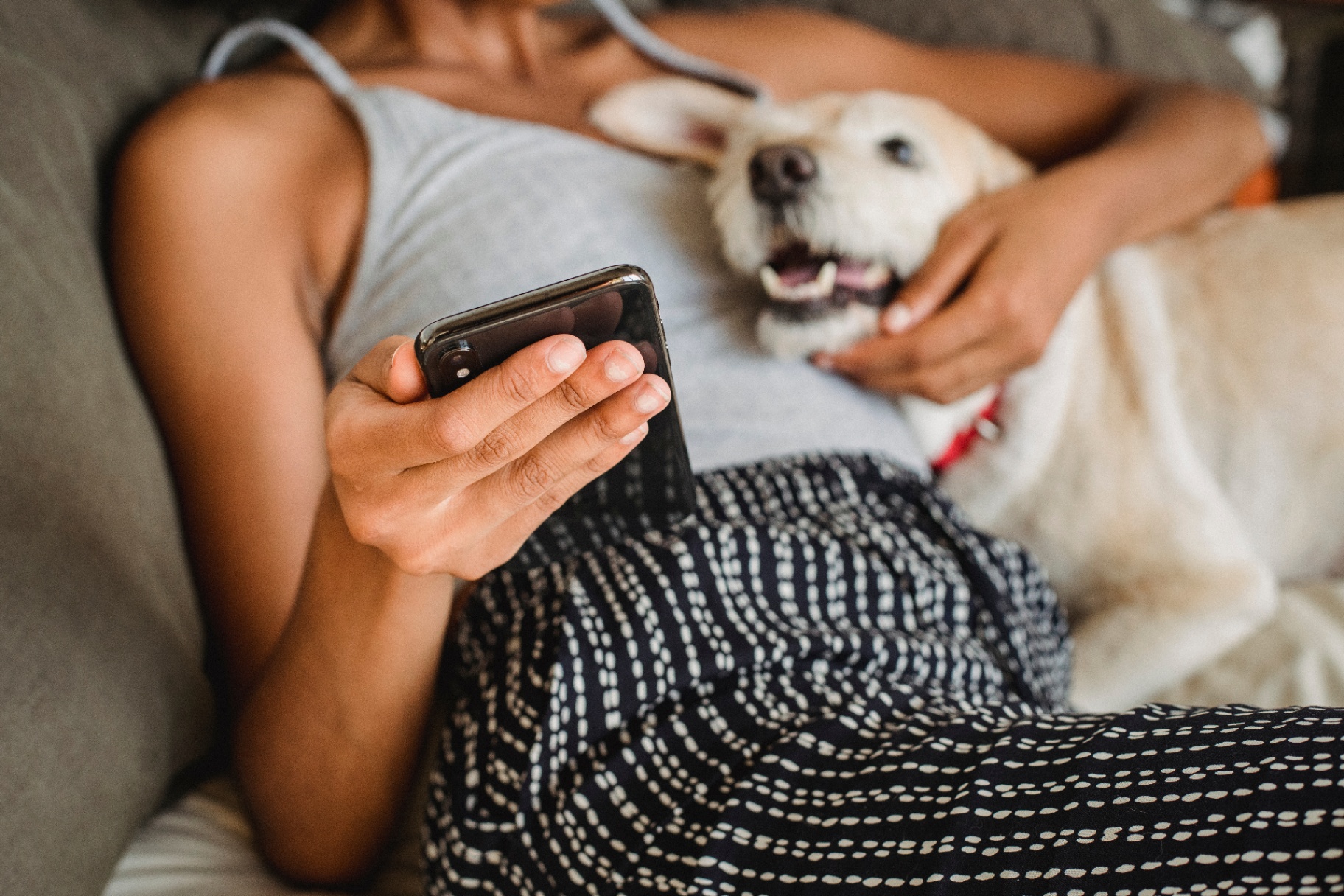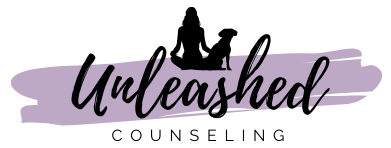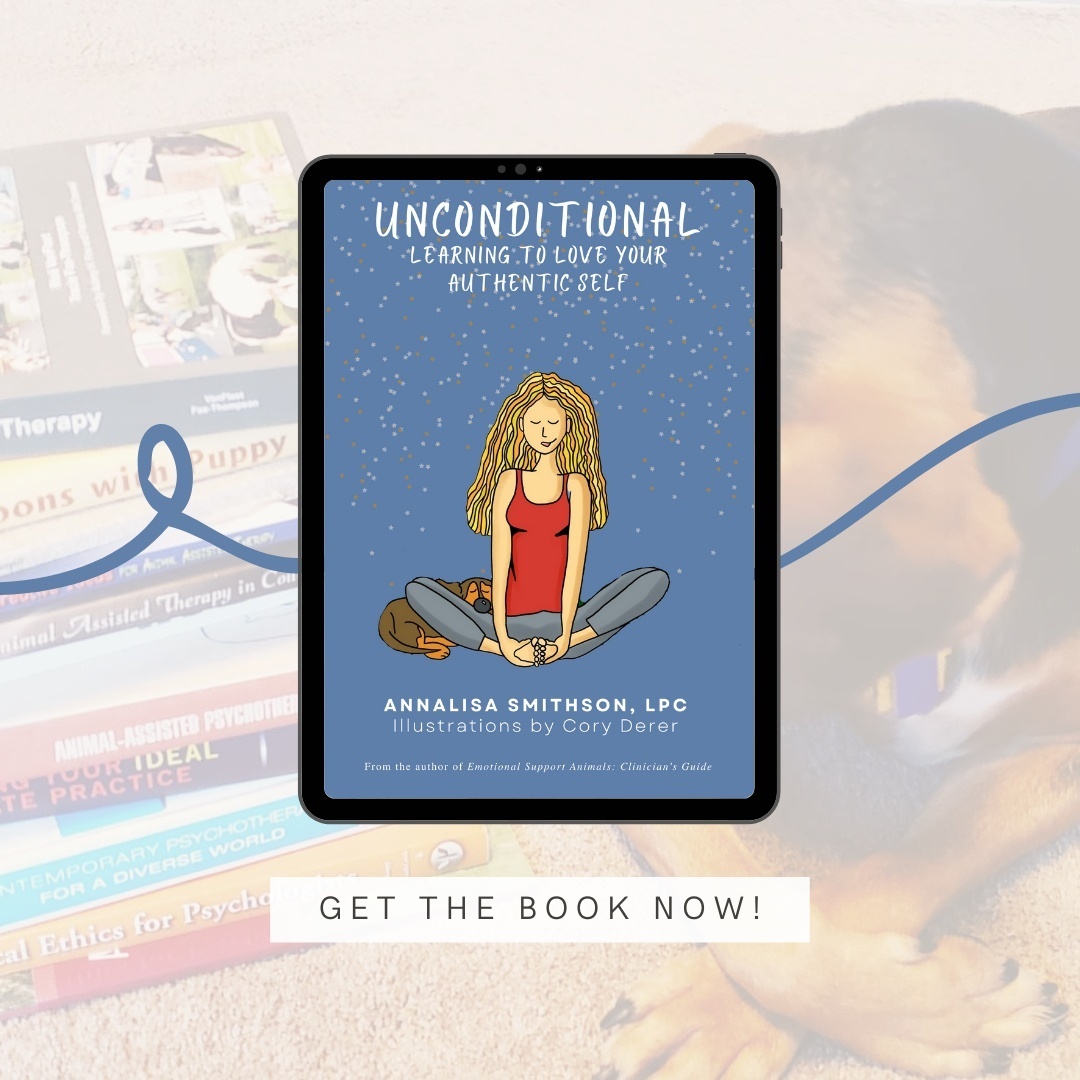Love Yourself Like Your Dog Loves You

The following is an excerpt from Unconditional: Learning to Love Your Authentic Self by Annalisa Smithson, LPC (available on Amazon now!)
In an earlier chapter, you spent some time exploring your greatest accomplishments and strengths. I find that most people need a nudge or two to stay on the positive path during this exercise. During groups and workshops, I often find myself corralling the conversation back to our strengths, as people inevitably bond over their faux pas and failures. Why is it so easy to take that sharp left and start naming our weaknesses when asked about our strengths? Humility is certainly a virtue and I don’t want to discourage it. However, I think there is a way to be both humble and authentic in our self-image—honoring both our areas of growth and our accomplishments.
I’d like to share the story of how I came to understand my strengths with the help of a therapy dog. But first, I’d like you to try the activity called “Letter from Doggo.” You’ll read my own letter from Doggo at the end of this chapter, but please don’t skip to the end just yet.
If Doggo Could Talk…
Imagine that your pet—or one you have bonded with in the past—can talk. Try to embrace the animal’s natural ability for unconditional love. Although most people think of dogs when we mention “unconditional love,” I do believe other pets experience a similar bond with their humans. Cats like to play, snuggle, and offer a healing purr when their human needs them. I have a friend whose social work program keeps an emotional support iguana (ahem, I mean dragon) for their young and curious clients. Even fish like to swim to the front of the tank and give a watery hello when their human walks by. My point is that any bonded animal can take the role of singing your praises. You just have to let them. Now, grab a pen and paper, and let yourself speak on your pet’s behalf.
- What would your pet say are your best qualities?
- What strengths does your pet see in you?
- Which of your accomplishments is your pet most proud of?
Write a Letter from Doggo
Letter-writing is a powerful therapeutic tool and you might be surprised at the immediate lift of your confidence as you complete this activity! This is actually one of my favorite activities after meeting a new client. Early in our work together, I invite my clients to write a letter from Benji (addressed to themselves) about how great it was to meet them. We do this together in session and make it as light and playful as possible; for example:
Dear Dominick,
It was great meeting you last week. When you threw my ball, I knew we would be good friends. You’re a natural athlete and I’m not surprised you played football in college. Here are some of the other strengths I noticed in you….
With Unconditional Love,
Benji
P.S. I’m sorry I farted during your session. Please know that it will happen again. Probably today.
Try writing a letter of this nature from one of your critters. Address it to yourself, no matter how silly it feels. Be honest, loving, and authentic, just like your pet. Let yourself laugh or smile. Let yourself be warmed by the light shining through Doggo’s rose-colored glasses. Don the playful puppy perspective. Notice how it feels to have someone else recognize your strengths and accomplishments. Put the letter someplace safe (like in your journal) and return to it whenever your inner critic starts talking trash on you.
Lessons We Learn from Animals
Now to return to my story. I wrote my own Letter from Doggo after the experience I’m about to share with you, but the dog in question wasn’t Benji.
On my first day of work as a bonafide clinician, I had a meeting with my new clinical director to talk about my responsibilities, my boundaries, and my self-care. This is a critical conversation for all new clinicians. Self-care and boundaries are vitally important to the long-term success of our careers. My new director had a straightforward, no-bullshit way of addressing people and she half-jokingly informed me, “All the best therapists have a therapist.” Despite her tone, I took her advice to heart and started looking for a personal therapist. It’s not easy to find a good therapist! There are practical considerations like insurance, distance, and availability. There are clinical questions about their training and expertise. But most importantly, there’s the therapeutic bond. Will I “click” with this person? It’s hard to open up to someone if you don’t click. Research supports this common-sense statement, as evidence points to the therapeutic alliance as one of the most important factors in positive counseling outcomes.
After several test runs, I found my ideal therapist. If you’ve read my Psychology Today profile, you’ll recognize this statement because my ideal therapist is a lot like my ideal client. She enjoys dogs, she has a sense of humor, and she embraces change. Enter Marcy Tocker, LPC, and Rosie the Pug, Therapy Doggo.
Marcy owns an animal sanctuary called Grey Muzzle Manor. She fosters senior dogs who would otherwise end up abandoned or euthanized. Senior pups don’t often get second chances, but Grey Muzzle is this little slice of heaven with wide open green spaces, a pack of other animals to play with, and the medicine they need for warm, compassionate end-of-life care. The Manor is also home to horses, goats, pigs, chickens, cats, and occasional surprises like visiting ducks. It’s a tranquil environment ideal for exploring one’s mental and emotional health. But a tranquil environment isn’t enough for it to be good therapy—you need a therapist for that. Our second or third session was in the early spring, still wet and chilly. I sludged through the mud and knocked on the cozy little trailer that overlooks the farm. This trailer is where Marcy sits and talks with clients when we’re not in the field, visiting horses and pigs. Marcy pushed the door open with her foot, both arms bundled around a fidgety blanket.
“Hi, come on in,” she said. “I need a few minutes before our session starts.” Marcy looked a little frazzled, if I’m being honest.
“No problem, take your time.” I knocked the mud off my boots and joined her inside. As I peeled off my jacket and got comfortable, I watched Marcy move around the room, arranging pillows on the floor and pushing furniture aside. She placed the fidgety blanket in the center of her makeshift playpen and waited. A snuffly little squish peeked through the bundle. I heard a goofy sound, part dog, part pig, and wondered what surprise critter Marcy had invited into her home today.
“This is Rosie,” Marcy told me breathlessly. “We don’t really have room for another foster right now, but I couldn’t say no. Pugs are just so dear to my heart.”
Rosie’s human could no longer care for her. I don’t know if they were moving, or bored, or what, but they begged Marcy to take her and she agreed. She didn’t realize when she agreed that Rosie had some kind of cognitive problem. There was no mistaking the elderly nature of the pup. She had lumps all over her little body, her wrinkled pug nose had grown dry, her fur was patchy. She was no less than a million years old. But lots of senior dogs look rough despite their puppy brains that keep them young and playful until the very end. For Rosie it was different.
She snuffled around her little makeshift fence, weaving back and forth as she walked.
She bumped into a cushion and ping-ponged to the other side. Her anxiety was palpable. She was in a new environment, her humans were gone, and something was misfiring in her puppy brain. She felt scared and vulnerable. I could see the concern on Marcy’s face, and I imagine I was seeing the tip of the iceberg; she’s a professional counselor, which makes her a pro at regulating her emotions, especially when a client is in the room. Rosie’s shuffling led her to my foot, and I leaned down to scratch her head. She gave my hand a push with her head, so I scooped her into my lap. Then she did something that was apparently remarkable. She spiraled once, stretched her body across my arm, pillowed my left hand, and fell fast asleep. I sat there awkwardly with my left arm extended under the dog. There would be no moving until Rosie was ready.
“I can’t believe it,” said Marcy. Her expression was nothing short of astonished. I still didn’t understand the significance.
“What?” I asked.
“Rosie has been here for two days and she hasn’t stopped moving once. She’s been bouncing off furniture the entire time.” Marcy was whispering now. “She’s finally sleeping!” In quiet tones she explained her suspicions about Rosie’s failing cognitive abilities. Physical ailments can be treated or at least made comfortable, but cognitive deficits in a senior dog indicate the end is coming. “Look at her,” Marcy said. “She’s so peaceful with you. What’s it like for you?”
I looked down at the sweet little squish, snoring in my palm, and I let myself feel the moment. Sometimes when the emotional feels are quite strong, it’s easier to start with baby steps, like the physical feelings. “My hand is warm, but also a little awkward. And that’s okay. I like being her bed. Her peacefulness is contagious. I feel calmer now that she’s settled down. I’m relieved she’s not so scared and anxious now. I guess I feel… honored.”
Rosie slept in my hand for the whole hour and when our session ended, I reluctantly handed her back to Marcy. She woke up and went back to the shuffling/weaving behaviors. I had given her the gift of a temporary peace, and she had given me a gift in return. For two weeks I held onto the feeling she had given me, savoring it. I journaled about it and took Rosie’s lesson to heart. I even wrote a “letter from Doggo.” When I returned to the farm two weeks later, I was excited to see Rosie again and to tell Marcy what I had learned from the experience. But the problem with loving a senior dog is that there’s never enough time.
“She passed away a few days ago,” Marcy told me gently, “I’m sorry.”
My eyes filled with tears and I sat in silence for a few minutes. “I’m sorry, too,” I said finally. It doesn’t seem fair that dogs are with us for such a short time. They are such a special gift to the human race. I took a deep breath and decided to share my story with Marcy, despite the sudden shift from happiness to grief. She listened with her whole self, in that beautiful, healing way only a master therapist can offer. “I guess Rosie had one last lesson to teach before she died. She taught you not to doubt yourself,” she said. “That’s really special.”
And she was right. You see, I had gone to therapy feeling upset and worried. I was doubting myself and my abilities. I wanted to be good at my job, but being a therapist is hard. Being a healer is hard. Rosie taught me that all the skills and techniques I had acquired were only extensions of the natural gift. I am a gifted healer. She brushed away my self-doubt when she found comfort simply by being in my presence. I processed the experience with Marcy, and I left feeling a mix of emotions: gratitude, sadness, nostalgia, acceptance, and peace. I planned to find my journal and write a second letter, this one from me to Rosie. Here are both letters.
A “letter from Doggo” on the day we met:
Dear Annalisa,
I’m so glad you came to the farm today. I was feeling quite poorly. You were so patient and calm while I explored the room. I think this must be one of your strengths. It really soothed my anxiety. And when I fell asleep in your arms you were very gentle and still. You must be an animal-lover to sit so still for me. You have the nature of a healer and a helper. I was able to relax and feel peace for the first time in days thanks to your healing nature. Don’t ever doubt yourself as a therapist or as a mother.
With unconditional love,
Rosie the Pug, Therapy Doggo
A letter from me, on the day that I learned she had died:
Dear Rosie,
I’m so grateful that I had the chance to meet you. You’re such a good dog and I hope you had a long and happy life before you became a Therapy Doggo on Marcy’s farm. You taught me an important lesson about my strengths and my natural talents. I will hold that lesson in my heart. You are one of many beloved animals I plan to meet on the rainbow bridge. I only wish we had had more time.
With unconditional love,
Annalisa
Today’s Act of Unconditional Self-Love
Snuggle your doggo (or cat or bunny or ferret or neighbor’s dog).
Today’s Journaling Prompts
- What special ingredient do pets have in their heart to make unconditional love so natural for them?
- What, exactly, is unconditional love?
- When did I last offer myself compassion? What was going on in my life at that time?

